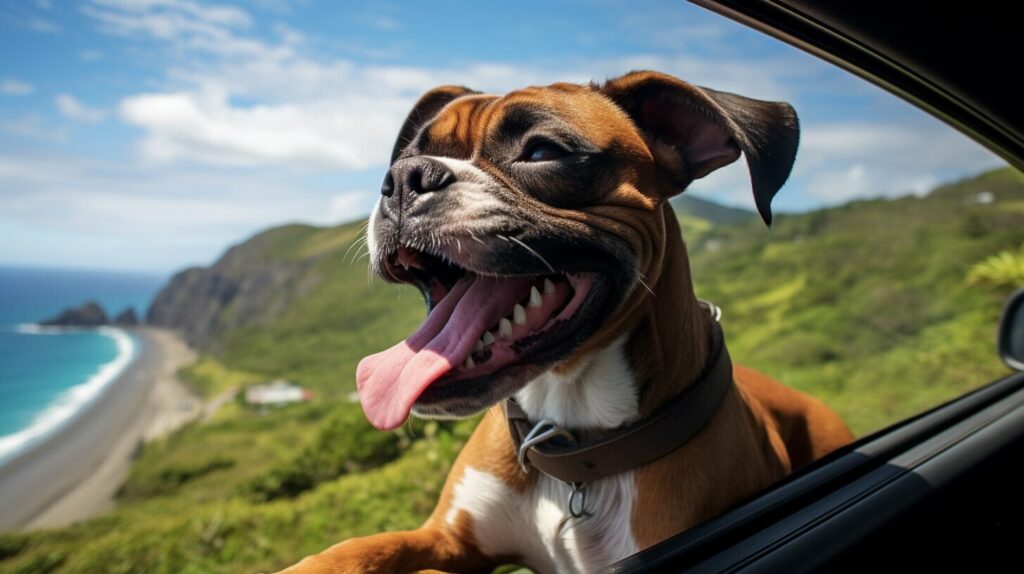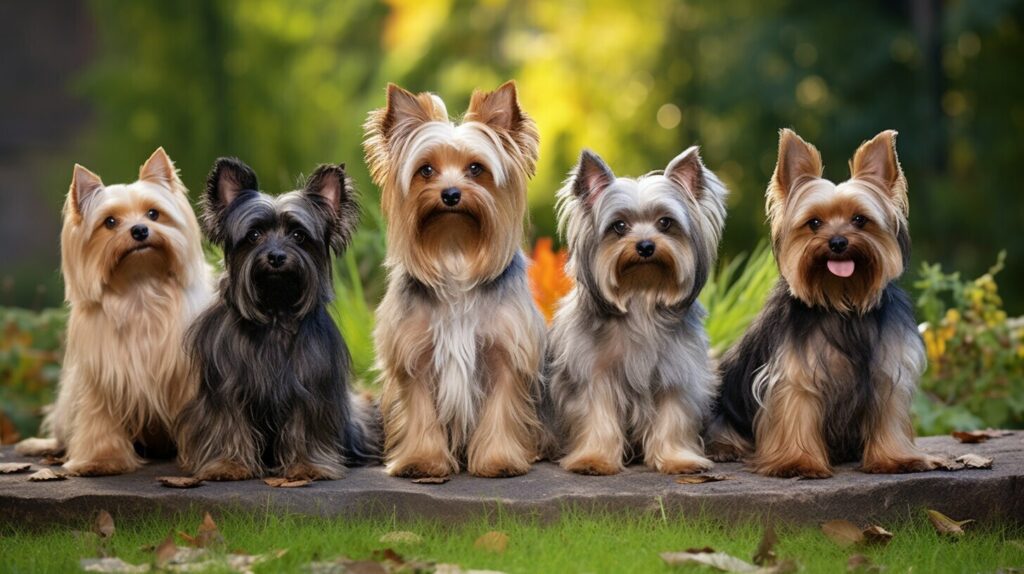If you’re considering a new furry companion, you may want to check out Boxers Dogs – a popular pet breed with a unique personality. This comprehensive guide will give you all the information you need to know about Boxers Dogs, from their history and temperament to their care and training needs.
Key Takeaways:
- Boxers Dogs have a unique personality and make great family pets.
- They have a rich history as hunting and guard dogs.
- Proper care and training are essential for their well-being and behavior.
- Boxers Dogs are active and social animals, often participating in various dog sports and community events.
Getting to Know Boxers Dogs
If you have never met a Boxer dog, you are in for a treat. Boxers are a medium-sized breed that is full of energy and spunk. They are known for their affectionate and loyal nature, making them an ideal companion for families and individuals alike.
Boxers Dogs are easily identifiable by their square-shaped head, muscular build, and short, shiny coat that can come in a variety of colors, including fawn, brindle, and white. They are also characterized by their wrinkles, particularly on their forehead when they are alert or curious.
Boxer Dog Characteristics
Boxers Dogs are athletic and need plenty of exercise and playtime. They are often described as “clowns” due to their playful nature and love of making their owners laugh. They are also known for their high energy levels, which can be channeled through walks, runs, or agility training.
When it comes to personality, Boxers Dogs are warm and affectionate. They love to cuddle and enjoy spending time with their family. They are also protective of their loved ones, which can make them excellent watchdogs. Boxers can sometimes be stubborn, but with consistent training and positive reinforcement, they can learn quickly.
Boxer Dog Temperament
Boxers Dogs have a reputation for being friendly and outgoing. They are often described as “people dogs” because of their love for human interaction. They get along well with children, making them an excellent family pet. Boxers Dogs can also be trained to socialize well with other animals, though early socialization is key.
Despite their playful nature, Boxers Dogs can be serious when they need to be. They are protective of their family and will defend them if they sense danger. They are also known for their alertness, making them an excellent watchdog.
Overall, Boxers Dogs are a delightful breed that can bring joy and companionship to anyone willing to invest time and energy into their training and care.
Boxer Dog History
Although the exact origins of Boxer Dogs are unclear, they are thought to have descended from the Bullenbeisser, a now-extinct breed used for hunting large game. In the 19th century, Boxers were developed in Germany as a versatile working breed, used for everything from guarding estates to performing in circus acts. During World War I, Boxers were enlisted as messenger dogs and even served on the front lines.
After the war, Boxer Dogs gained popularity both in Europe and the United States as companion animals. The American Kennel Club officially recognized the breed in 1904, and today Boxers are consistently ranked among the top 10 most popular dog breeds in the United States.
Boxer Dog Care: Essential Tips
Boxers Dogs are energetic and playful pets that require proper care to maintain their health and happiness. Here are some essential tips to keep in mind:
Grooming
Boxers Dogs have a short and smooth coat that only requires occasional brushing to remove loose hair. However, they still need regular baths to keep their skin and coat healthy. You should also trim their nails, clean their ears, and brush their teeth on a regular basis to prevent dental issues.
Exercise
Boxers Dogs are high-energy dogs that require plenty of exercise. You should aim for at least an hour of physical activity each day, such as walks, runs, or playtime in a fenced yard. Without enough exercise, Boxers Dogs may develop destructive behaviors or become overweight.
Nutrition
A balanced diet is crucial for keeping Boxers Dogs healthy and happy. You should choose high-quality commercial dog food or prepare their meals at home, following a veterinarian-approved recipe. Avoid overfeeding and giving your Boxer table scraps, which can lead to obesity and digestive issues.
Common Health Issues
Boxers Dogs are prone to certain health conditions, such as hip dysplasia, cancer, and heart disease. You should schedule regular check-ups with your veterinarian and be aware of any potential symptoms or changes in behavior. Early detection and treatment can prevent serious complications.
By following these essential tips, you can ensure that your Boxers Dogs stay healthy, happy, and well-cared for.
Boxer Dog Training: Effective Techniques
Boxer Dogs are intelligent and eager to please, making them excellent candidates for training. Whether you’re looking to teach basic obedience commands or more advanced tricks, Boxers Dogs are quick learners and respond well to positive reinforcement techniques.
When training your Boxer Dog, it’s important to establish a clear hierarchy and set consistent rules. Boxers Dogs thrive on routine and structure, so be sure to reward good behavior and discourage bad habits.
Positive Reinforcement Training
One of the most effective training techniques for Boxers Dogs is positive reinforcement. This involves rewarding your dog for good behavior with treats, praise, or playtime. Positive reinforcement helps build your dog’s confidence and strengthens the bond between you and your pet. It’s also a more humane and gentle approach to training than using punishment or aggression.
When using positive reinforcement, be sure to reward your Boxer immediately after they perform the desired behavior. This will help them understand which actions are being rewarded and increase the likelihood of them repeating the behavior in the future.
Basic Obedience Commands
Teaching your Boxer basic obedience commands is an important part of their training. These commands include sit, stay, come, and heel. Start with one command at a time and be patient with your dog as they learn. Use the positive reinforcement technique to encourage good behavior and discourage bad habits.
Remember to keep training sessions short and frequent, rather than long and infrequent. This will help keep your dog engaged and prevent them from becoming bored or distracted.
House Training
House training your Boxer Dog is an essential part of their training. Start by establishing a regular feeding and bathroom routine and taking your dog outside on a regular basis. Reward your dog when they go to the bathroom outside and discourage accidents inside the house. Be patient with your dog as they learn and provide plenty of positive reinforcement for good behavior.
Socialization Training
Boxer Dogs are social creatures and thrive on interaction with people and other animals. Socialization training helps your dog learn how to interact with other dogs, people, and new environments. Start socializing your Boxer at a young age and expose them to a variety of people, animals, and situations. Use positive reinforcement to encourage good behavior and slowly introduce your dog to new experiences as they become more comfortable.
Training your Boxer Dog can be a rewarding and fulfilling experience for both you and your pet. Remember to be patient, consistent, and positive in your approach to training. With time and practice, your Boxer will become a well-behaved and loyal companion that brings joy to your life.
Boxer Puppies: Bringing Home Your New Companion
If you’re considering bringing a Boxer puppy into your home, it’s important to be prepared for the responsibilities that come with raising and training a new companion. Here are some essential tips to help you get started:
Choosing a Breeder or Adoption Agency
When looking for a Boxer puppy, it’s important to choose a reputable breeder or adoption agency. Research breeders in your area and ask for references or referrals from other Boxer owners. Visit the breeder’s facilities and make sure the puppies are well-cared for and healthy.
If you choose to adopt a Boxer puppy, check with local animal shelters or Boxer rescue organizations. Adopting a puppy can be a rewarding and compassionate choice, as it provides a forever home for a dog in need.
Preparing Your Home
Before bringing your Boxer puppy home, create a comfortable and safe living space for them. This should include a designated area for sleeping, eating, and playing. Puppy-proof your home by removing any hazards, such as electrical cords and chemicals, and ensuring that doors and windows are secure.
Invest in high-quality puppy supplies, including a comfortable bed, food and water bowls, toys, and a leash and collar. Consider purchasing a crate for crate training, which can help with house training and provide a safe space for your puppy when you’re not home.
Initial Training and Socialization
Start training your Boxer puppy as soon as you bring them home. Positive reinforcement techniques, such as rewards for good behavior, are effective for training Boxers Dogs. Teach basic commands, such as “sit,” “stay,” and “come,” and work on leash training.
Socialization is also crucial for Boxer puppies, as it helps them develop social skills and feel comfortable in new situations. Expose your puppy to a variety of people, animals, and environments, and provide plenty of positive reinforcement for good behavior.
With these tips and a little patience, bringing a Boxer puppy into your home can be a rewarding and enjoyable experience for both you and your new companion.
Boxer Dog Health: Prevention and Care
As a Boxer dog owner, it’s important to prioritize their health and well-being. Here are some essential tips for keeping your Boxer dog healthy:
Preventive Measures
Preventing health problems is always better than treating them. Make sure to keep up with your Boxer dog’s vaccinations and annual check-ups with the veterinarian. It’s also important to keep up with their dental care to prevent gum disease and tooth decay.
Healthy Diet
A well-balanced and nutritious diet is key to your Boxer dog’s health. Choose high-quality dog food and avoid overfeeding to maintain a healthy weight. Consult with your veterinarian to determine the appropriate portion sizes and feeding schedule for your Boxer dog’s specific needs.
Exercise
Regular exercise is important for keeping your Boxer dog physically and mentally healthy. This breed is known for their high energy levels and requires daily exercise to avoid restlessness and boredom. Make sure to provide them with opportunities to play, run, and explore.
Recognizing Signs of Illness
It’s important to be able to recognize signs of illness in your Boxer dog so that you can seek veterinary assistance as soon as possible. Be on the lookout for symptoms such as lethargy, loss of appetite, vomiting, diarrhea, excessive thirst, or difficulty breathing.
By following these tips and staying proactive about your Boxer dog’s health, you can help ensure a long and happy life for your furry friend.
Boxer Dog and Family: A Perfect Match
Boxers Dogs are known for their loyalty and devotion to their human families. Their friendly and playful nature makes Boxers a perfect match for families with children and other pets.
Boxers are also protective of their families, which can make them excellent guard dogs. However, their protective instincts should be properly channelled through training and socialization to avoid aggressiveness towards strangers.
Boxer Dog Temperament
Boxers have a confident and outgoing temperament, making them excellent companions for families with active lifestyles. They are highly energetic and require daily exercise and mental stimulation to prevent boredom and destructive behaviour.
Boxers are also intelligent and eager to please their owners, which makes them relatively easy to train. Positive reinforcement techniques work best with Boxers, as they respond well to praise and rewards.
However, it’s important to remember that each Boxer has its own personality and will respond differently to training and socialization. Some Boxers may be more reserved or shy, while others may be more rambunctious and playful. It’s essential to get to know your Boxer and cater to its unique needs and personality.
Boxer Dogs in the Community: Activities and Events
Are you looking to get more involved with the Boxers Dogs community? Luckily, there are plenty of activities and events that are perfect for Boxer enthusiasts!
One popular activity is dog sports, which can include agility, obedience, and tracking competitions. These events allow your Boxer to show off their skills and intelligence, and provide a great opportunity for bonding and socialization.
Training clubs are another option for getting involved with Boxer Dogs. These clubs offer classes and workshops for both dogs and their owners, teaching new skills and techniques for everything from basic obedience to advanced agility.
If you’re looking to give back to your community while spending time with your Boxer, there are also opportunities for volunteering with organizations that support dogs and other animals. This can include local shelters, rescues, and therapy dog programs.
Overall, the Boxers Dogs community is lively and welcoming, with plenty of ways to get involved and connect with other Boxer enthusiasts. So whether you’re looking to compete in dog sports or simply make new friends, there’s something for everyone in this passionate and dedicated community.
Conclusion
Congratulations! You have now become well-acquainted with the world of Boxers Dogs. From their unique characteristics and temperament to their history and health, you now have a comprehensive understanding of this beloved breed.
Remember, owning a Boxer Dog requires responsibility, dedication, and love. By following the tips and techniques outlined in this guide, you can ensure that your Boxers Dogs remain healthy, happy, and well-trained.
If you are looking for a loyal and affectionate companion, Boxers Dogs may be an excellent fit for you and your family. Join the vibrant Boxers Dogs community and take advantage of the various activities and events available to Boxer owners.
Thank you for taking the time to explore the world of Boxers Dogs. We hope this guide has been informative and helpful in your journey as a Boxer owner. Best of luck to you and your furry friend!
FAQ
Q: What are the physical characteristics of Boxer dogs?
A: Boxer dogs are medium-sized, muscular dogs with a square, strong build. They have a short coat, a broad, short skull, and a powerful jaw. Their ears are typically cropped and their tails are docked.
Q: What is the temperament of Boxer dogs?
A: Boxer dogs are known for being playful, energetic, and friendly. They are loyal and protective of their families, making them excellent guard dogs. They are also intelligent and eager to please, which makes them relatively easy to train.
Q: How should I care for my Boxer dog?
A: Boxer dogs require regular exercise to keep them physically and mentally stimulated. They also need a balanced diet and regular grooming to maintain their coat and overall health. It’s important to provide them with proper veterinary care, including vaccinations and regular check-ups.
Q: What are common health issues in Boxer dogs?
A: Boxer dogs are prone to certain health conditions, such as hip dysplasia, heart problems, and certain types of cancer. Regular veterinary check-ups, a healthy diet, and exercise can help prevent and manage these issues.
Q: How can I train my Boxer dog?
A: Training a Boxer dog requires consistency, positive reinforcement, and patience. They respond well to reward-based training methods and are known for their intelligence and eagerness to please. Basic obedience commands, house training, and socialization are important aspects of training a Boxer.
Q: Can Boxer dogs get along with children and other pets?
A: Yes, Boxer dogs are generally good with children and can be great family pets. They are also known to get along well with other pets, especially if they are properly socialized from an early age. However, supervision and proper introductions are always recommended.



